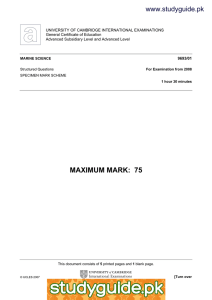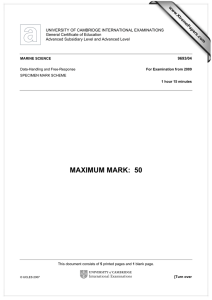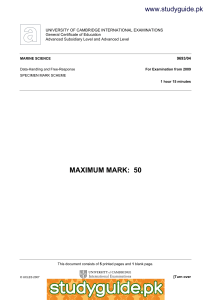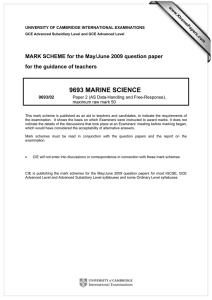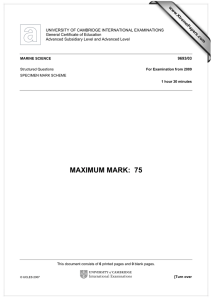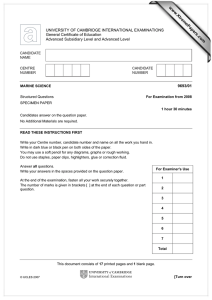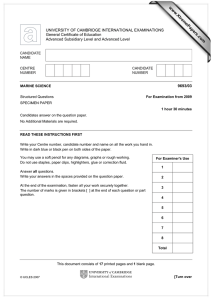www.XtremePapers.com
advertisement
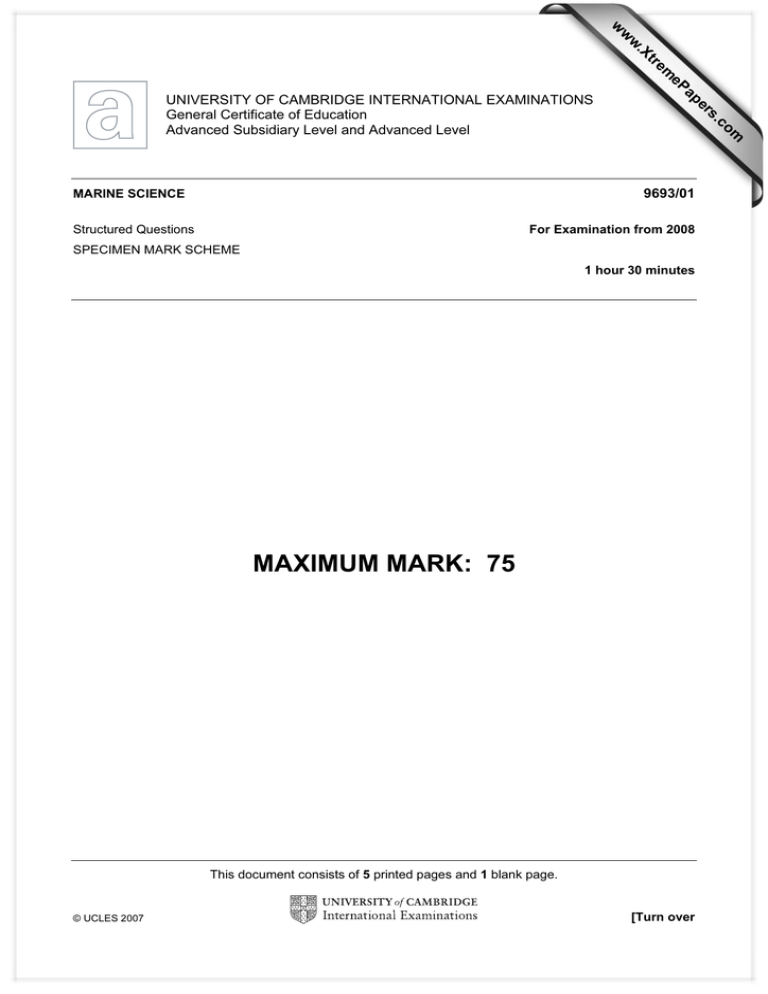
w w om .c s er MARINE SCIENCE ap eP m e tr .X w UNIVERSITY OF CAMBRIDGE INTERNATIONAL EXAMINATIONS General Certificate of Education Advanced Subsidiary Level and Advanced Level 9693/01 For Examination from 2008 Structured Questions SPECIMEN MARK SCHEME 1 hour 30 minutes MAXIMUM MARK: 75 This document consists of 5 printed pages and 1 blank page. © UCLES 2007 [Turn over 2 1 (a) sun; [1] (b) zooplankton/krill; [1] (c) 18%;; (1mark for correct working) [2] (d) 0.072;; (1mark for correct working) [2] (e) heat/respiration; faeces/undigested food/uneaten/inedible components; [2] (f) Any 2 of: captures light energy; for use by plants; ref. to converting light energy to chemical/potential energy that is then available to the rest of the food chain; [2] (g) (from X to Y) rapid increase/from 12 to 34/ in biomass; increased photosynthesis; [2] + 2 of: increasing level of light; temperature increasing; increase in nutrients; [2] [Total: 14] 2 (a) relationship between two organisms; (symbiosis) both organisms benefit; (parasitism) parasite gains benefit, host is harmed; [3] (b) Any 4 of: host is coral; (zooxanthellae) within tissues; reference to mutualism; provide coral with nutrients; (named nutrient) carbohydrate/glucose; with oxygen; remove carbon dioxide; remove phosphate; (c) tissues contain chemosynthetic bacteria; these metabolise hydrogen sulphide; provide nutrients for tube worms; [4] [3] [Total: 10] © UCLES 2007 9693/01/SM/08 3 3 (a) 56.5%;; [2] (b) 910;; [2] (c) 2 of: some species not correctly identified; some species missed/counted several times; possibly different survey methods; data collection not repeated; (d) (i) overall general fall to 2002; most rapid fall in 1998; starts to increase in 2002; [2] [3] (ii) 3 of: increase in predation; over fishing/collection; major storms; other valid reason; [3] [Total: 12] 4 (a) Any 4 of: ref. to earth’s surface as plates; ref. to plates moving; ref. to plate boundary; ref. to all named boundaries (convergent, divergent, collisional, transform); ref. to any 1 consequence of plate movement, e.g. volcanoes, earthquakes, mountain formation; [4] (b) spatial relationship of current continents; related fossils on continents; similar rock formations on current continents; [3] (c) 2 plates pulling apart; hot magma fills gap; accumulates to form new ocean floor on ridge; [3] [Total: 10] © UCLES 2007 9693/01/SM/08 [Turn over 4 5 (a) (i) no light for photosynthesis; bacteria can metabolise hydrogen sulphide; animals feed on bacteria; (ii) 1 – ocean water passes into rock through cracks; 2 – water is heated by magma; 3 – superheated water at high pressure with high mineral content; 4 – minerals deposited and build up to form chimney; (b) line continues at low level to vent; immediate rise to near top of graph at vent; falls gradually to original level; [3] [4] [3] [Total: 10] 6 (a) hurricane/typhoon; [1] (b) (i) 26 °C; [1] (ii) E; [1] (iii) evaporation; [1] (iv) falls; [1] (c) Any 3 of: death/injury; damage to homes/buildings; damage to infrastructure; loss of power supplies; destruction of crops; spread of disease; financial costs; loss of employment; [3] [Total: 8] © UCLES 2007 9693/01/SM/08 5 7 (a) 3 of: dissolves in soil water; run off into rivers into sea; taken in/used in photosynthesis/used in protein synthesis by phytoplankton/algae; passes along food chain to fish; (b) (i) 15 correct plots;;; – 1 each incorrect correct line joining all plots; [3] [4] (ii) 0.12 µmol/dm3 per year; [2] (iii) some fertiliser remains in soil and run off continues; [1] (iv) year of above normal rainfall carries phosphates from soil to sea; [1] [Total: 11] © UCLES 2007 9693/01/SM/08 6 BLANK PAGE © UCLES 2007 9693/01/SM/08
